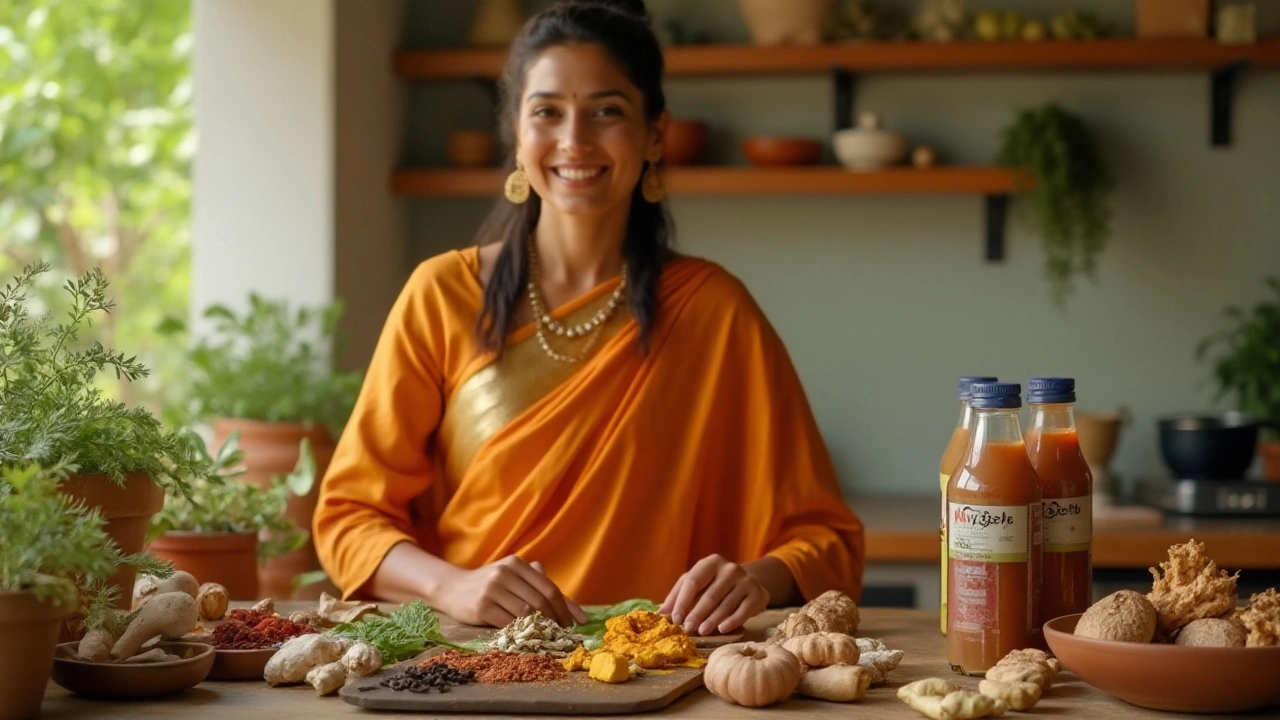In the realm of Ayurveda, food is not only a means of sustenance but a powerful tool for achieving balance and wellness. The ancient texts suggest that our daily diet plays a crucial role in maintaining harmony within our bodies and with the world around us. But what happens when this harmony is disturbed?
According to Ayurvedic beliefs, certain foods can disturb the delicate balance between the doshas—Vata, Pitta, and Kapha—leading to conditions such as inflammation. Modern dietary habits, with their emphasis on processed foods and refined sugars, can exacerbate these imbalances. Therefore, recognizing and moderating the consumption of these inflammatory foods is essential for maintaining health.
Join me as we explore Ayurvedic insights into which foods might be causing bodily turmoil and how simple shifts in diet can restore tranquility and vitality. Armed with this knowledge, you can make informed choices that support your journey to holistic health.
- Understanding Inflammation in Ayurveda
- Common Inflammatory Foods in Ayurveda
- Balancing Doshas with Diet
- Practical Tips for an Ayurvedic Anti-Inflammatory Diet
Understanding Inflammation in Ayurveda
Inflammation is often viewed in modern science as the body's natural response to injury or infection. However, in the holistic world of Ayurveda, inflammation encompasses more than just physical reactions. It is perceived as an imbalance within the body, often linked to the disruption of the three fundamental doshas: Vata, Pitta, and Kapha. This interruption can manifest in various forms, from visible skin rashes to unseen internal disturbances affecting the digestive system and mental clarity.
The ancient Ayurvedic texts categorize inflammation under a broader term known as 'Ama,' a toxic substance that accumulates in the body due to improper digestion. Ama is considered the root cause of illnesses, as it clogs the channels of the body, hindering normal bodily functions. The presence of Ama is a clear indication of a disharmony within the body's natural processes, primarily triggered by poor dietary choices, unhealthy lifestyle practices, and emotional stress. These factors contribute to the compromise of the Agni, or digestive fire, which is crucial in metabolizing consumed food efficiently.
In understanding inflammation, it's essential to comprehend the role each dosha plays. Pitta, primarily associated with fire and water elements, is often linked directly to inflammatory processes due to its hot, sharp, and acidic qualities. When in excess, Pitta can lead to conditions characterized by heat and irritation, such as inflammations and ulcers. Conversely, an imbalance in Vata can also contribute to inflammation by causing dryness and irregularities in bodily movements, which may heighten stress on bodily systems. Meanwhile, excess Kapha, characterized by heaviness and stagnation, can lead to fluid retention and congestion, further propagating inflammatory responses.
"Ayurveda teaches us to cherish our innate nature - 'to love and honor who we are', not as what people think or tell us, 'who we should be.'" - Prana Gogia, Ayurvedic Practitioner
Addressing inflammation, therefore, involves a comprehensive approach where diet, lifestyle, and mental wellness are aligned with one's unique constitutional needs. The application of this knowledge can lead to profound changes in well-being, reducing inflammatory symptoms. Balancing the doshas through proper dietary selections and lifestyle adjustments forms the cornerstone of Ayurvedic treatment strategies.
One of the key principles is eating according to one's dosha type. For instance, those with a predominance of Pitta should focus on cooling, nourishing foods while avoiding spicy, oily, and heat-inducing meals that could provoke further imbalance. This attention to dietary specifics helps maintain the integrity of the holistic health principles Buddhism promotes.

Common Inflammatory Foods in Ayurveda
Ayurveda places great importance on the foods we consume daily, linking them directly to how we feel, both physically and mentally. This ancient wisdom identifies certain foods that may contribute to inflammation, a key factor in many chronic ailments. In this holistic system, inflammation is often associated with an imbalance in the doshas, particularly Pitta, which when aggravated, heats the body up excessively.
Among the primary offenders in this category are heavily processed foods. These include items that are high in preservatives, artificial additives, and refined sugars. Such foods are thought to not only disturb the digestive fire or 'Agni' but also impede the natural balance of the doshas. The focus is on foods that have lost their prana, or life force, through extensive processing, which can disturb the body's natural rhythm.
Refined sugars and sweeteners are also highlighted in Ayurvedic texts as potential inflammation triggers. These substances, when consumed in excess, are believed to irritate the internal stomach lining and increase 'Ama', a toxic waste product accumulated through improper digestion. This Ama is often seen as the root of many ailments, including the aggravation of doshas leading to inflammatory responses.
Certain oils, particularly those low in quality and often used in fried foods, are flagged due to their potential to produce bodily heat and stagnation. Opting for oils with anti-inflammatory properties, like ghee or virgin olive oil, is often recommended to mitigate such effects. Ayurveda encourages individuals to be discerning with oil types, favoring those pressed freshly and consumed in moderation.
The revered sage Charaka once noted, "When diet is wrong, medicine is of no use. When diet is correct, medicine is of no need." This underscores the profound emphasis Ayurvedic practitioners place on dietary habits as a foundation for health.
An interesting aspect within Ayurvedic practice is the attention given to nightshade vegetables. Foods like tomatoes, potatoes, and eggplants, although nutritious, are sometimes viewed with caution in Ayurveda as they can purportedly trigger inflammation in sensitive individuals. This doesn't mean they need to be avoided entirely but rather monitored for their individual effects on well-being and consumed in balance.
In relation to dairy, Ayurveda does not typically advocate for its complete exclusion. However, it questions the consumption of aged cheeses and certain yogurts, which might lead to mucus formation and eventually inflammation, especially in Kapha-dominant individuals.
A shift towards a diet filled with fresh, organic, and whole foods is highly advised. Including plenty of alkaline-forming fruits and vegetables, particularly those that are in season, is believed to help neutralize excessive acidity and bring peace to the Pitta dosha, hence reducing inflammation. As a guiding principle, favor foods that are both nourishing and soothing, providing both energy and tranquility in the long run.

Balancing Doshas with Diet
The ancient science of Ayurveda teaches that the key to well-being lies in maintaining balance among the three doshas: Vata, Pitta, and Kapha. Each dosha represents a combination of the five natural elements and governs specific physiological functions within the body. A personalized approach to diet is often needed to keep these energies in harmony, as each person’s constitution is unique. Disruptions in this balance can lead to inflammation and various health issues, hence understanding your dosha type is vital to tailoring your diet effectively.
To begin with, identifying your dominant dosha can provide insights into your natural tendencies and susceptibilities. Vata, for instance, is characterized by the elements of air and space, leading to traits of creativity and agility but also to issues like dryness and anxiety when imbalanced. The Pitta dosha, comprised of fire and water, influences metabolism and digestion. If agitated, it may exacerbate feelings of anger or inflammation. Kapha, a mix of earth and water, typically embodies calmness and strength, yet can cause lethargy and congestion if out of balance. A diet that takes these characteristics into account can help mitigate inflammatory responses.
Incorporating foods that naturally pacify an aggravated dosha is crucial. For example, individuals with an excess of Vata energy, which is cold and dry in nature, might benefit from warm, moist, and nourishing meals like stews and soups. Spices such as ginger and cinnamon can be particularly helpful for stimulating digestion and reducing Vata-related disorders. Conversely, those with a dominant Pitta dosha should focus on cooling foods to counteract heat, opting for refreshing fruits like melons or cucumbers, along with bitter greens to soothe fiery imbalances. Lastly, Kapha-prone individuals may experience benefits from light, spicy, and astringent foods to prevent sluggishness and build energy levels.
Research indicates that integrating these dietary adjustments can lead to significant improvements in overall health and reduced inflammatory markers. As Ayurvedic expert Dr. Vasant Lad suggests, "Food can be both the cause and the solution; choosing wisely makes all the difference."
The principles of tailoring one’s diet to their dosha type encourage mindful eating that not only aligns with one’s physical needs but also promotes mental clarity and emotional balance.Incorporating this holistic perspective fosters a deeper connection to the food we consume and its immense power to heal.
To support your journey towards a balanced diet, creating a personal routine is essential. Consider the timing of your meals as aligning meal times with one’s dosha can boost digestion. Early risers with Vata imbalances might prefer a hearty breakfast to ground their day, while a kapha-imbalance may thrive on a lighter morning meal. Recommended meal plans should also include a variety of fresh, seasonal produce, aiming to keep the ingredients as close to their natural state as possible. This focus on simplicity and quality not only satisfies doshic needs but echoes the Ayurvedic tenet of living in harmony with nature’s own rhythms.
Adopting an Ayurvedic approach to balancing your doshas with diet can transform your health in profound ways. It encourages a lifelong commitment to learning about yourself and crafting a dietary path that supports your best self. As you grow in this journey, you will find greater peace, vitality, and a deeper understanding of how the foods you eat connect you to the universal dance of elements within and around you.

Practical Tips for an Ayurvedic Anti-Inflammatory Diet
Diving into the practice of an Ayurvedic anti-inflammatory diet calls for knowledge and commitment to reshaping your eating habits. This gentle yet powerful approach encourages the use of nature's gifts to promote balance and well-being. The key is not just about avoiding certain foods, but embracing a holistic way of living that resonates deeply with your individual constitution.
Building the foundation of an Ayurvedic diet involves understanding your dosha—Vata, Pitta, or Kapha. When you know your dominant dosha, you can adjust your food intake to bring balance, thus reducing inflammation naturally. For instance, those with Pitta dominance, often characterized by a fiery temperament, should focus on cooling foods such as cucumbers, mint, and leafy greens. These foods can help soothe the excessive heat that triggers inflammation.
One might ask, "How do I incorporate these principles into daily life?" Start by opting for wholesome, unprocessed foods that align with your doshic needs. Reduce consumption of processed and refined foods high in sugar and unhealthy fats, which are often linked with heightened inflammation. Instead, choose whole grains like quinoa and millet, along with lentils and chickpeas for protein. Incorporate seasonal fruits and vegetables to ensure vital, nutrient-rich meals.
Spices play a pivotal role in Ayurveda, known not only for their flavors but their healing properties. Turmeric, ginger, and black pepper have proven anti-inflammatory benefits. Add a dash of turmeric to soups or a sprinkle of ginger to your teas. As Dr. Vasant Lad, founder of The Ayurvedic Institute, emphasizes,
"Spices are nature's medicine—they balance our bodily doshas and enhance digestion."This wisdom reflects the ancient understanding of using everyday ingredients as preventive medicine.
Paying attention to how your meals are prepared can also influence their impact on inflammation. Ayurveda champions cooked foods over raw, especially during cooler months, to aid digestion and maintain internal warmth. Cooking with healthy oils, like ghee or virgin coconut oil, further supports digestive health, mitigating inflammation. The right oils lubricate the tissues and cells, leading to a more balanced system.
Managing stress and staying active are complementary to dietary changes. Incorporate daily routines like gentle yoga or meditation to harness mind-body harmony. This alignment minimizes stress-induced inflammatory responses, creating a buffer for your body's natural healing processes. As you nurture this balance, you pave the way for lasting vitality that transcends the boundaries of simple dietary changes.
Finally, tracking your progress is crucial. A simple tool like keeping a food diary can help you observe how different foods affect your body. This not only helps in identifying irritants but empowers you to make informed choices. By progressively embracing these Ayurvedic strategies, each meal can become a stepping stone towards harmony and health.
